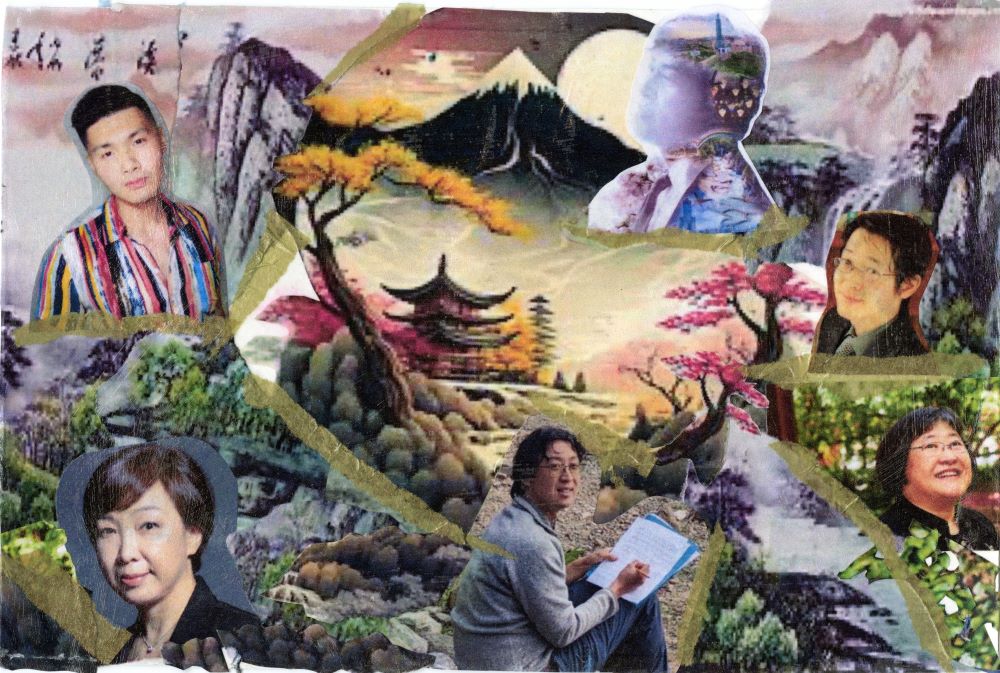
Saturday, June 7, 2025 at 8:00 pm
Pre-concert talk at 7:00 pm by director Freddie Coleman
Featured Works
Our season finale celebrates the rich tapestry of choral music being crafted by contemporary Asian composers. These beloved and beautiful pieces from China, Taiwan, Korea, the Philippines, and Japan were carefully curated by Artistic Director Freddie Coleman.
Experience the universal language of music that connects us globally, as we bring the vibrant voices of Asia to your ears.
Featured Composers
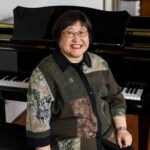 Chen Yi
Chen Yi
 Wei-Pin Chen
Wei-Pin Chen

Saunder Choi
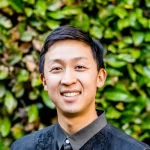
Eric Tuan

Hye-Young Cho
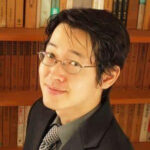
Kentaro Sato
About the Music
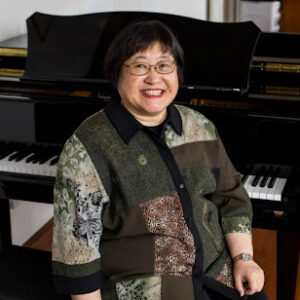
Dr. Chen Yi
Arirang (Korea)
Arranged by Chen Yi
Two Chinese Folk Songs – Fengyang Song, Mayila
Arranged by Chen Yi
Distance Can’t Keep Us Two Apart
by Chen Yi
About Chen Yi
Over a career spanning nearly 50 years, Dr. Chen Yi has established herself as one of the most significant artistic voices of her generation. Born in China in 1953 and raised during the Cultural Revolution, Dr. Chen began her career as a violinist, procuring the post of concertmaster of the Peking Opera Orchestra in Guangzhou while still a teenager. She received her Bachelor and Master’s degrees in Composition from the Central Conservatory of Music in Beijing, becoming the first woman to receive the latter degree from the institution. She later obtained her DMA in Composition from Columbia University.
Dr. Chen has had works performed by many of the world’s greatest ensembles, such as the NY and LA Philharmonics, the BBC, Cleveland, and Singapore Symphony Orchestras, the St. Paul Chamber Orchestra, and Chanticleer, and has collaborated with soloists such as Yehudi Menuhin, Yo-Yo Ma, and Evelyn Glennie. Chen’s understanding of and respect for distinctly different musical traditions, and the impeccable skill with which she blends them, whether in small arrangements for consorts of traditional Chinese instruments, large symphonic works utilizing Western instruments, or a plethora of pieces that employ both, is nothing short of remarkable. She is currently a Distinguished Professor at the University of Missouri-Kansas City Conservatory of Music and Dance.
About the Music
We often hear people say that music transcends any race, language, or ideology. “Arirang”, a Korean folk song, does just that. In its origin and history, the song is filled with symbolic expressions. It is a song that not only embraces emotions of sorrow and anger, but also happiness and joy. “Arirang” is the most popular traditional folk song of Koreans.
The song with the refrain “Arirang, arirang, arariyo” is often dubbed a “second national anthem” or an “unofficial national anthem” of Korea because virtually all Koreans, even those living in North Korea and abroad, can sing at least part of it due to its easy melody and tune.
But little is known about the exact origin and history of the song although it has been the subject of study by many Korean scholars. Experts say there are some 40 different theories on the origin of the song.
Next we will present two popular folk songs chosen from a three-volume set of works, prepared by Dr. Chen Yi, collected from the provinces of China.
Commissioned by the American Choral Directors Association Endowment, Dr. Chen’s Distance Can’t Keep Us Two Apart was premiered by seven choirs at ACDA division conferences across the country. The text reflects greetings of love that have been popularly used among Chinese people to share their friendship, love, trust, and encouragement.
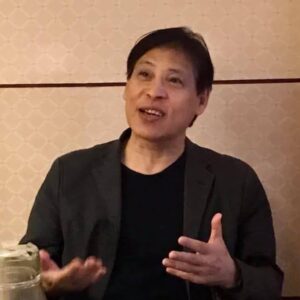
Wei-Pin Chen
Floating Moon on the Water (Taiwan)
by Wei-Pin Chen
About Wei-Pin Chen
Born in Taiwan in 1953, Wei-Pin Chen has been fascinated by Taiwanese, a language native in the area, but on the verge of extinction. Taiwanese is fragile by design because of the lack of a written form. It was prohibited to use Taiwanese in public under past martial law. Chen began composing after moving to Japan for his career as a dentist and life science scholar, writing songs almost exclusively in Taiwanese. With inspiration from William Wu, a renowned tenor and choral conductor with whom Chen had worked in Japan, Chen’s compositions began a new wave of Taiwanese songs after sixty years of linguistic suppression. A Taiwanese poet said, “I never knew that a Taiwanese song could be so Schubert.” Chen was nominated for the Golden Melody award for his first album, which includes songs written only in Taiwanese. One musician described Chen’s music by stating, “He passes down the most Taiwanese voice.”
About the Music
Floating Moon on the Water uses a beautiful text in Taiwanese by Wei-Pin Chen. Using western tonality blended with Taiwanese elements, the melody begins with a touch of sadness and is followed by flowing sounds of pictures on the water.
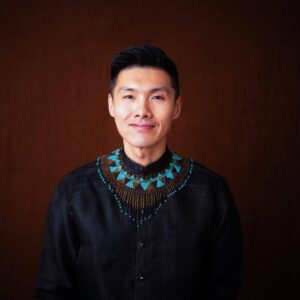
Saunder Choi
Leron, Leron Sinta
arr. by Saunder Choi (Philippines)
About Saunder Choi
Saunder Choi is a Los Angeles-based Filipino composer and choral artist whose works have been performed internationally by various groups including Conspirare, the Philippine Madrigal Singers, Santa Fe Desert Chorale, Los Angeles Master Chorale, Pacific Chorale, World Youth Choir, Brightwork New Music, People Inside Electronics, and many others. As an arranger and orchestrator, Saunder has written for Tony-Award winner Lea Salonga, Singapore Symphony Orchestra, San Francisco Symphony, Orquestra Filarmónica Portuguesa, Gay Men’s Chorus of Los Angeles, San Francisco Gay Men’s Chorus, among others.
As a choral artist, he sings with Pacific Chorale, L.A. Choral Lab, HEX Vocal Ensemble, as well as in film scores such as the soundtrack of Disney’s The Lion King (2019), Mulan (2020), Turning Red (2022), Nope (2022), and Avatar: The Way of the Water (2022).
Saunder believes in music as advocacy, using the media as a platform for diversity, equity, inclusion, justice. His compositions are focused on narratives and conversations surrounding immigration, racial justice, LGBTQ+ advocacy, climate justice, and representations of his identity as a Filipino-Chinese. He is currently Director of Music at Unitarian Universalist Community Church of Santa Monica and a teaching artist with the Los Angeles Master Chorale.
About the Music
Leron, Leron Sinta or “My Dear, Little Leron,” is a popular Filipino folk song from the Tagalog region. It is traditionally a work song, representing those who are in the fields harvesting fruits, though the origin is unclear due to the lack of scholarly literature that examines Philippine folk music. It is often presented as a children’s song, though some parts of the text may have been meant for a more mature audience. Some sources also refer to it as a courtship song.
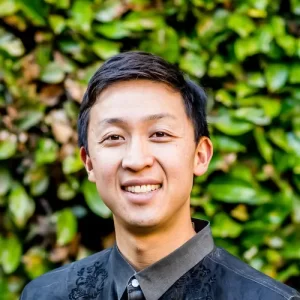
Eric Tuan
Unending Love
by Eric Tuan (USA)
About Eric Tuan
Eric Tuan is celebrated for his innovative programming and musical excellence in the choral arts. He is in his fifth season as Artistic Director of the Piedmont East Bay Children’s Choir, leading a rigorous program for 270 youth singers and directing top ensembles in local and international performances. As the founder and Artistic Director of Convivium, a chamber chorus, Tuan focuses on underrepresented voices and social justice themes. He also serves as Director of Music and Organist at Christ Episcopal Church in Los Altos.
An active composer, Tuan’s works are frequently commissioned and performed by leading choral groups such as Volti and Peninsula Women’s Chorus. His compositions have been featured at conventions and on broadcasts like BBC Radio 3, often addressing contemporary social issues.
Tuan has premiered over thirty new works and has performed with professional groups like Volti and Philharmonia Baroque Chorale. He studied under renowned mentors and holds a B.A. in Music from Stanford University and a Master of Music from the University of Cambridge, supported by a Gates Cambridge Scholarship. A third-generation Bay Area resident, Tuan is of Chinese, Japanese, and Filipino descent.
About the Music
Eric Tuan’s mesmerizing setting of Unending Love was composed for the 2017 wedding of a Stanford Chamber Chorale alum. It is richly scored for eight independent voice parts. Unending Love draws on the poetry of the Bengali polymath Rabindranath Tagore. The first person of color to win the Nobel Prize in Literature, Tagore’s work ranged widely across the realms of poetry, fiction, drama, visual art, and musical composition. Tuan gives Tagore’s lyrical poetry an equally effusive musical setting, drawing on lush added-tone sonorities and overlapping waves of imitative counterpoint.
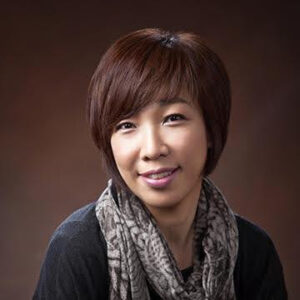
Hye-Young Cho
Evocation (Mon-Nee-Joh) (South Korea)
by Hye-Young Cho
About Hye-Young Cho
Hye-Young Cho (b. 1969) is considered one of the leading composers in South Korea. Her works have been performed in almost every choir and commissioned by most major professional choirs in South Korea. Notably, she was commissioned to write a Te Deum for the opening concert of the World Symposium on Choral Music (WSCM) held in Seoul, Korea (2014).
Currently, she is the resident composer for Incheon City Chorale. She has also been the resident composer for the Ansan City Choir and National Chorus of Korea. She is the former president of the Korean Choral Composition Association (KCCA) and has taught at Hanyang University, Konkuk University, and Kangwon National University. She received bachelor’s and master’s degrees in composition at Hanyang University in Seoul, Korea.
About the Music
Evocation is a gorgeous, lyrical piece by South Korean composer Hye-Young Cho. The heart-wrenching poem is about a person who has lost a loved one and recalls the memory of this individual. As the years pass, they may forget certain things, but they cannot, and will not, forget their loved one.
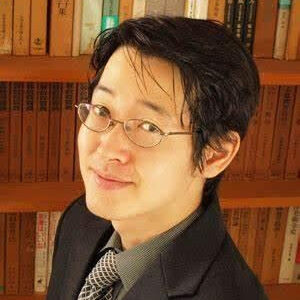
Kentaro Sato
Choral Suite “Phoenix”
by Kentaro Sato (Japan)
About Kentaro Sato
Kentaro Sato (b. 1981), Ken-P to his friends, is an award-winning composer, conductor, and lyricist. His symphonic and other instrumental works have been featured in TV/Film media, game industry and concert performing groups around the world such as the London Symphony Orchestra, the Philharmonia Orchestra and the Sydney Symphony Orchestra.
In the choral music world, Sato is best known as the winner of the prestigious ACDA Raymond W. Brock Memorial Composition Contest for “Kyrie” from Missa pro Pace (Mass for Peace), which was premiered at the 2005 ACDA National Convention in Los Angeles. He is also a frequent guest conductor and lecturer for various choral workshops and reading sessions around the world.
As a busy VO artist and singer, Sato’s voice has represented companies such as Disney, Microsoft, Visa, American Express, Discovery Channel to name some, heightening products and services, and educating users and customers.
Sato was born in Hamamatsu, Japan, a manufacturing city known for musical instruments. He received a Master of Music in Conducting with Distinction and a Bachelor of Music in Media Writing from California State University, Northridge. In addition to his music degrees, he holds degree in cinema from Santa Monica College.
Sato currently serves as the conductor of Meiji University Glee Club, and a lecturer at Shobi University, teaching music composition, arrangement, recording and music technology and production. His past positions include a resident composer/assistant conductor of the Torrance Symphony (2005-2012), and a composition/music production lecturer at Shobi College of Music (2011-2015).
About the Music
Notes from Kentaro Sato:
My piece, Phoenix is a choral suite with accompaniment for orchestra or organ. The theme of the work is the mythological bird “Phoenix”, as the title suggests. The lyrics were created by reconstructing and adding sentences to the poetry of Lactantius, a writer from North Africa who was active in the Roman Empire city of Constantinople (now Istanbul, Turkey) in the 3rd – 4th century. Aiming for music that will be sung over and over again, just like a phoenix being revived over and over again, I have created a song that will spread its wings from my native Hamamatsu to the world with lyrics composed in Latin, which is the universal language of choral singing.
In the first movement, “The Land of Happiness,” the chorus sings about the island of “The Land of Happiness,” which is said to be far to the east, to the sound of the orchestra’s slow waves.
In the second movement, “His Bird is a Phoenix,” the chorus sings about a phoenix that lives in a land of happiness to a sparkling accompaniment.
In the third movement, “The Death and Resurrection of the Phoenix,” the chorus sings mysteriously, sometimes harshly, and gently about the phoenix facing death and then resurrection.
In the fourth movement, “Song of the Phoenix,” the chorus sings our hopes and wishes for the resurrected phoenix to the glorious sound of the orchestra.
